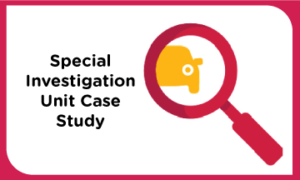Insurance Fraud can be classified into two categories: hard fraud and soft fraud. Hard fraud is the deliberate falsification of a claim. Soft fraud is viewed as a crime of opportunity, such as padding a legitimate claim to gain additional money from the insurance carrier. According to the Coalition Against Insurance Fraud, at least $308.6B is stolen every year from American consumers due to insurance fraud. The National Insurance Crime Bureau (NICB) states that all consumers are victims of insurance fraud. “Not only does fraud cause higher insurance premiums for all of us, it also raises our taxes and inflates prices for consumer goods,” the NICB says.
Maryland Auto recently investigated a claim in which a policyholder claimed to have struck and killed a leashed dog near a park in Southern Maryland. However, the investigation of the claim uncovered several red flags.
Although this story may appear disturbing, Maryland Auto believes that no actual animals were harmed in the production of this claim.
The dog, which was a rare and expensive breed, was supposedly struck and killed while on a walk with its owner. The pedestrian dog owner was not hit.
When the claim adjuster asked the policyholder why they filed the claim two months after the incident, the policyholder explained that the dog’s owner had recently texted him to request reimbursement.
Maryland Auto’s Claims Department then contacted the owner of the dog. The owner stated that he was walking his dog when a black car ran over his animal. The dog was killed on impact. He claimed to have called the police to the scene but was told that it would be several hours before they would respond, since no people were injured. No phone records were submitted to confirm this call.
Despite a significant impact being reported, there was no physical damage to the insured vehicle and no biological residue was found on the vehicle. There were also no photographs from the scene.
The owner of the dog could not provide any documentation to support that an autopsy was completed on the dog by a veterinarian, nor any documentation to support the removal of the carcass or cremation. A specific gravesite was never identified, either.
The only documentation the dog owner could provide is an invoice from a breeder, stating that the price for the dog was $7,500. The owner did not provide documentation from his credit card that he claimed to use for the purchase to confirm the transaction.
The invoice indicated that the dog breeder was located in California. However, the address provided was for a bicycle shop and the phone number was traced to an address in Ohio.
Further research indicated that the phone number listed for the policyholder was in the name of the dog owner However, the policyholder and dog owner claimed to not know each other.
When the dog owner was asked to provide a photo of the dog, it was determined that the image provided was an internet stock photo of the rare breed. No valid photographs of the dog could be provided.
Once confronted with the false information provided, the dog owner then claimed to have met a man at a rest stop in another state to obtain the puppy. He then claimed to have been scammed by the breeder and threatened to pursue legal action.
The claim was referred to Maryland Auto’s Special Investigations Unit (SIU) for further investigation. The Maryland Auto investigator visited the location of the crash but could not find any biological evidence. Although there are no cameras in the area, the investigator found someone who lives near the alleged accident site. The homeowner said that he has a view of the area from the front room of his home, where he watches television in the afternoon. He did not recall the reported incident and indicated that he would have noticed if any vehicles were stopped, or any if confrontation had occurred.
To clarify the inconsistencies in the claim, the investigator requested an Examination Under Oath (EUO) from the dog owner, who failed to appear at the scheduled appointment. When contacted about missing the EUO, the dog owner became agitated and belligerent, asserting that Maryland Auto was attempting to prove that the incident was fraudulent.
Due to the lack of evidence and numerous inconsistencies, Maryland Auto denied the claim. The claim was then forwarded to Maryland’s Insurance Fraud Division for further review.




